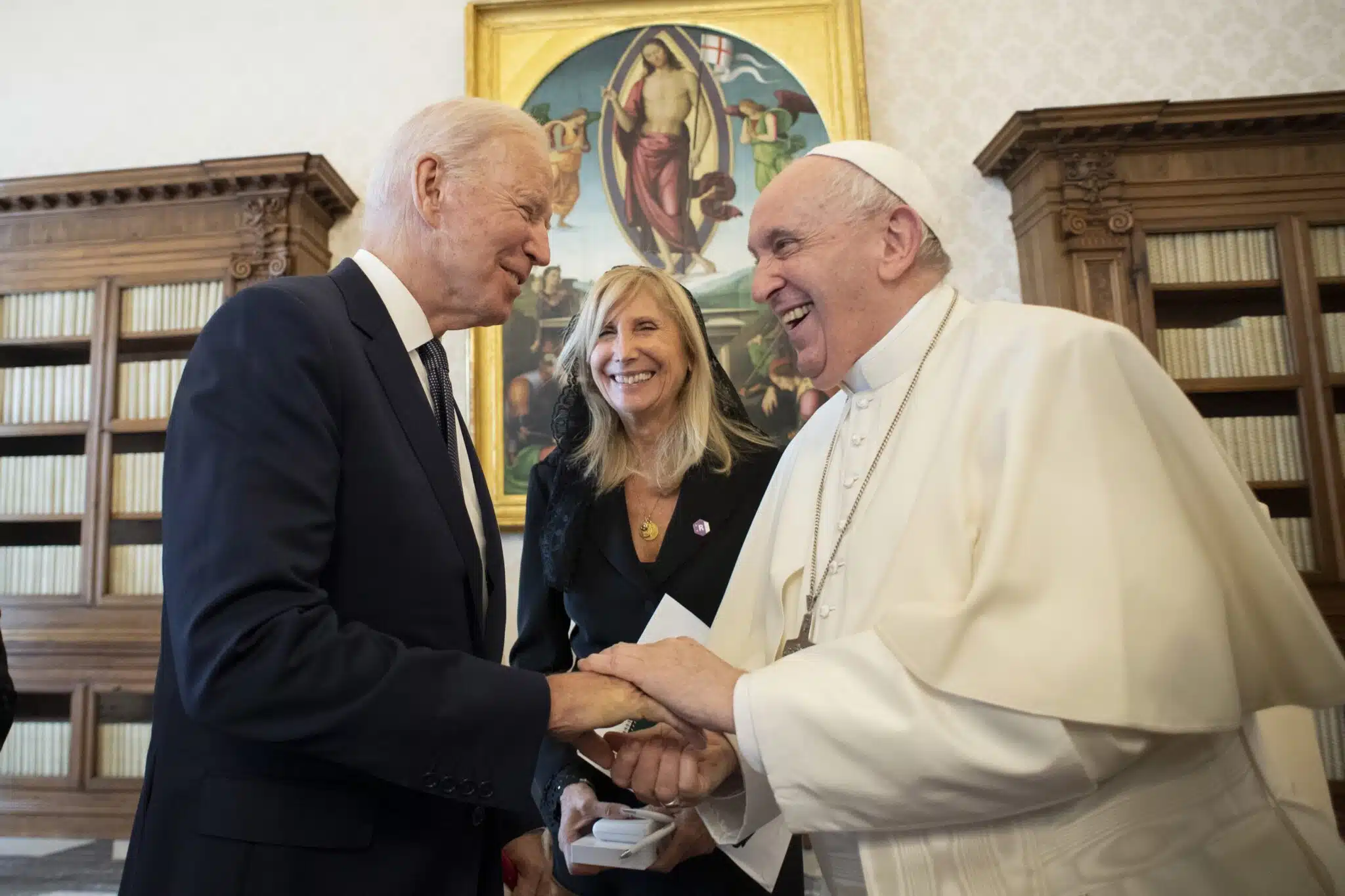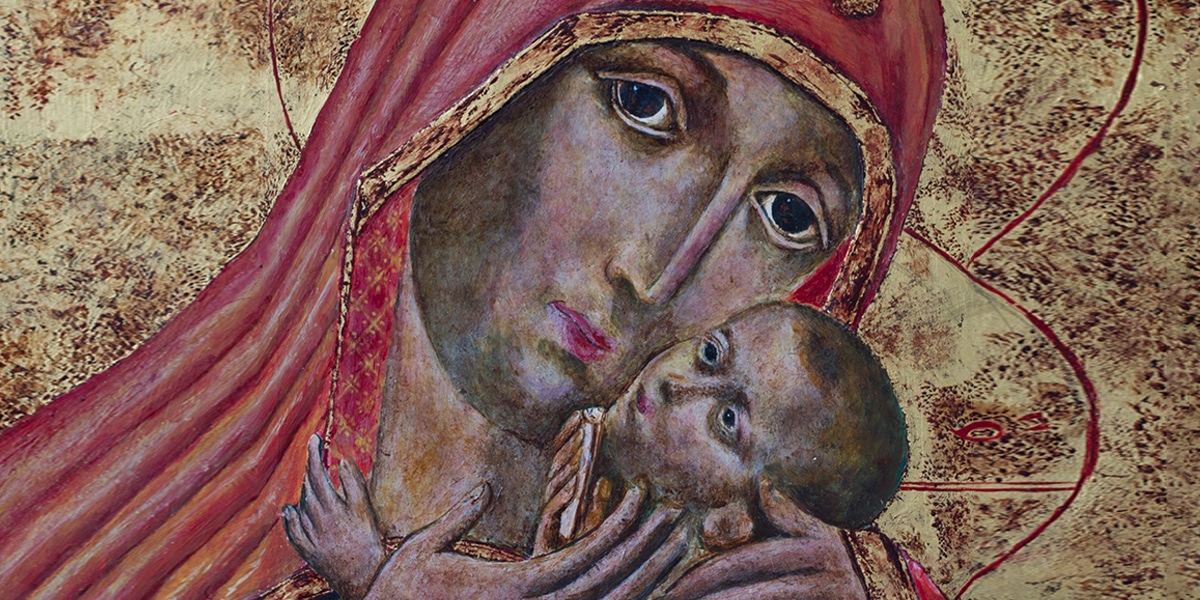Francis of Assisi (Francesco di Bernardone)
1181/82–1226
Francis of Assisi, a creative and spiritual genius born at the end of the twelfth century in Assisi, Italy, was the son of a wealthy cloth merchant, Pietro Bernardone. Though his father wanted him to join the family business, Francis was a high-spirited youth with extravagant tastes, a generous spirit, and a heart set on earthly fame as a knight or soldier. Early sources describe his worldly ambition and desire for military glory in these years, including several significant dreams that helped to point him in a new direction:
After a while, a marvelous thing happened to this blessed man which in my estimation should not be passed over in silence. One night when he was asleep in his bed, someone appeared to him calling him by name. He led him into a palace of unspeakable beauty, filled with military arms, its walls covered everywhere with shining shields emblazoned with crosses. He inquired to whom these brightly shining arms and this beautiful palace belonged. “All these things, including the palace,” said the guide, “belong to you and your knights.”
Francis interprets this dream to mean that he will become a great prince who is successful in war. He becomes a knight and goes off to join a noble count to engage in battle. He then has a second dream:
It was night when he arrived in Spoleto and, anxious about his trip, he retired for the night. Half asleep, he heard a voice asking him where he intended to go. He outlined to him his whole plan. The voice then asked him: “Who can do more for you, the lord or the servant?” “The lord,” he answered. “Then why are you abandoning the lord for the servant, and the patron for the client?” To which Francis responded: “Lord, what do you want me to do?” “Go back” [God] said, “to your own land to do what the Lord will tell you.” It seemed to him that divine grace had suddenly made him a different man.
Once when Francis was returning to Assisi, he was horrified to meet a leper on the road. Francis had always been repulsed by leprosy:
One day he was riding his horse near Assisi, when he met a leper. And, even though he usually shuddered at lepers, he made himself dismount, and gave him a coin, kissing his hand as he did so. After he accepted a kiss of peace from him, Francis remounted and continued on his way. He then began to consider himself less and less, until, by God’s grace, he came to complete victory over himself.
At another time, Francis met a poor knight on the road, and having compassion for this noble man who was reduced to begging, he generously gave him his costly garments. Through these experiences, Francis discovered that his heart yearned to serve a new master, Jesus Christ, and as he listened to the life of Jesus in the Gospels, he longed to imitate his poverty and humility. He became a beggar in Assisi, a rebuilder of crumbling churches, giving all his money to the poor, refusing any part of his father’s wealth, living among the lepers, seeking only to know God’s will by living the Gospel. It was not long before his radical but authentic life began to attract followers.
With Francis in the lead, a small group of men traveled to Rome to beg permission from Pope Innocent III to live as religious brothers under a Rule of Life based on the Gospels.
The Order of Friars Minor grew so rapidly that within twenty years, the friars numbered over five thousand members. Today it remains one of the most vibrant and attractive religious orders in the Church. The genius of Francis’ spirituality was his recognition that the Gospels could and should be lived by every person; this calling is not reserved for the clergy or those in religious vows. The origin of our vocation to pursue holiness is our baptismal call, and everyone, in every path and circumstance, is called to an authentic Gospel life, loving God and one another, following in the footprints of Jesus Christ.
Clare of Assisi (Chiara di Offreduccio)
1193–1253
A contemporary of St. Francis, St. Clare was born into a noble and privileged family in Assisi, and from her earliest years she was renowned in the city for her goodness, generosity, compassion for the poor, and devotion to prayer.
Although her family hoped to have her marry well and secure a worldly fortune and position, Clare was fascinated by the preaching of a young man in Assisi who had renounced his father’s wealth, lived among the poor, and was proclaiming the Gospel of Jesus Christ with a passion and conviction that far outshone the preaching and example of the local clergy. Francis of Assisi looked like a beggar but was filled with joy, and his words struck a deep chord in her heart as she witnessed the effect of his example in the city.
On Palm Sunday 1212, when the young women of Assisi gathered in the church to celebrate the opening services of Holy Week, Clare was prepared to make a dramatic and life-changing decision.
That evening, accompanied by a family servant, she silently fled from her home and met St. Francis in the valley below Assisi, where he welcomed her as the first woman to embrace his newly formed Gospel community. Clare exchanged her fine clothes for the clothes of the poor and professed obedience to Francis in the little chapel where Francis and his brothers were living near Assisi, Our Lady of the Angels.
She defied the intentions of her family and the religious culture of the period to begin a new foundation of religious women dedicated to following the Gospel in absolute poverty, without property as a means of support but relying on the care of the brothers and trust in God. In time, Clare would become known as the cofounder of the Franciscan movement and the foundress of the Second Order, today known as the Poor Clares.
To learn more, check out St. Anthony Messenger‘s Clare and Francis: Assisi’s Most Dangerous Citizens.








